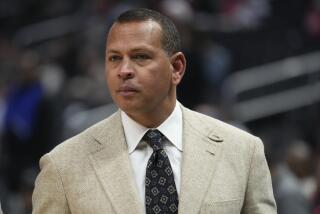Donald Nixon Says Cuba Sought Drug He, Vesco Tested : Intrigue: He claims he and the fugitive financier were held because authorities coveted their ‘miracle’ medicine.
- Share via
IRVINE — President Richard Nixon’s nephew, Donald Nixon, who was held under house arrest in Havana while Cuban officials investigated his ties to fugitive financier Robert Vesco, said Wednesday he believes that authorities may have been after a “miracle drug” that he and Vesco were testing.
Nixon, 49, said he had been working through Vesco with the Cuban government for three years to test a spinoff of the controversial anti-AIDS drug Viroxan, a citronella-based substance that Nixon believes cured his wife of breast cancer and arthritis. Nixon was detained for 30 days in a Havana hotel room. Although Cuban authorities did not arrest him, they did not give him permission to leave until Sunday.
At a news conference at his attorney’s office in Irvine, Nixon said he was detained on May 31, the same day that Vesco was arrested on charges of being a foreign agent. Nixon had been a guest living in Vesco’s Havana home and was in a venture with Vesco to develop an “immune adjuvant” drug to combat AIDS and other illnesses.
“After three years of creating the basic elements for double-blind clinical trials in humans in six countries, as well as completion of Cuba’s research, [Cuban laboratories] were able to produce the product at relatively low cost,” Nixon said in a prepared statement. “However, interestingly enough, two weeks after the purest material was produced, the people from counterintelligence came into Vesco’s home and immediately took him away.”
Nixon said he does not believe that Vesco was a foreign agent. Vesco “had nowhere to go,” Nixon said. “There was no reason for him to break the law.”
Nixon’s theory is one of the first set forth outside of Cuba to explain why the Cuban government would arrest the 59-year-old Vesco after allowing him to live in the country for 12 years. Vesco fled the United States for Costa Rica in 1972 after the Securities and Exchange Commission charged that Vesco had diverted more than $220 million from four mutual funds.
Local experts doubted that the anti-AIDS drug could be, as Nixon puts it, “a medical breakthrough.” “I am open-minded,” said Dr. Donald Forthal, an infectious diseases expert and assistant professor of medicine at UC Irvine, “but am skeptical about this.”
The drug’s predecessor, Viroxan, was widely criticized after its inventor, an Orange County physician, administered the drug to AIDS patients. Although touted as a cure, the homemade substance hastened the deaths of at least two AIDS patients, according to state medical officials. The physician, Stephen Herman, agreed to surrender his medical license in 1991 after state prosecutors agreed to drop civil charges of gross negligence, incompetence, dishonesty and other offenses, according to his attorney.
More to Read
Sign up for Essential California
The most important California stories and recommendations in your inbox every morning.
You may occasionally receive promotional content from the Los Angeles Times.











